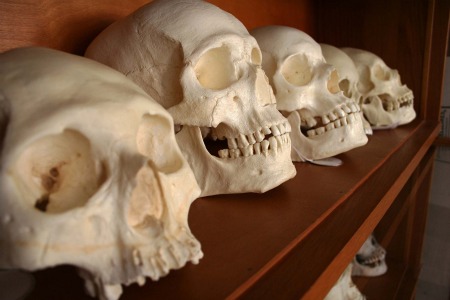Art & Exhibitions
Zimbabwean President Mugabe Tells British Museum to Return Human Skulls


Eileen Kinsella


Cecil Rhodes and the Matabele izinDuna make peace in the Matopos Hills, as depicted by Robert Baden-Powell, 1896.
Photo: Courtesy of Wikipedia.
Zimbabwean president Robert Mugabe is demanding that London’s Natural History Museum return the skulls of a group of revolutionaries who were killed and decapitated by British colonizers in the late 19th century, according to the Guardian.
Mugabe made his remarks at a ceremony on August 10 to commemorate veterans on National Heroes Day. Mugabe claims the skulls belong to leaders of the First Chimurenga (also known as the Second Matabele War), an uprising against white settlers in what was then known as Rhodesia.
As part of his speech, Mugabe said: “Surely keeping decapitated heads as war trophies, in this day and age, in a national history museum, must rank among the highest forms of racist moral decadence, sadism and human insensitivity.”
British officials responded with a statement from the British embassy in Harare: “The issue of the potential repatriation of Zimbabwean human remains was first discussed by British and Zimbabwean Authorities in December 2014. The UK has since invited Zimbabwe to appoint techinical experts to meet their Museum counterparts in London, in order to discuss some remains of Zimbabwean origin. It is not yet clear whether these remains are related to the events places or people referred to in the President’s speech this week.”
Mugabe said once the remains are repatriated, the government will consult with leaders about how to bury them at sacred shrines throughout the country.
As the Guardian report notes, repatriation of human remains is a “fraught legacy of European colonialism in Africa.” In 2011, Germany returned 20 skulls to the Namibian embassy in Berlin that had once been used for racial experiments, Der Spiegel reports. “At the time, they viewed the skulls not as human remains but as material with which to investigate and classify race,” a representative from Charité, one of the largest hospitals in Berlin, told the news outlet.
Britain confirms Robert Mugabe's claim a London museum has Zimbabwean heroes' skulls http://t.co/mw7tFFvt3a pic.twitter.com/LiiKnpSWbw
— Telegraph News (@TelegraphNews) August 13, 2015
Related stories:
Sindika Dokolo Wants to Repatriate All African Art Stolen During Colonial Era
Boston’s Kimono Controversy Rages On
Petition Blasts KKK Imagery in Florida Courthouse Mural
Christie’s to Sell Controversial Chris Ofili Virgin Mary Dung Portrait